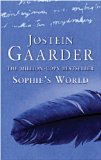TOK Books
 |

Below you see a collection of books that I’ve read (some of them completely, some of them partially) in preparation of my course. Each book has a somewhat different approach to the topic. Some are easily readable, others require more concentration. Some have a more “theory based” approach, others try to engage the reader more. More books will be added (as I read them)…
Several books presented here are introductory philosophy books. In my (humble, most personal) view, TOK should not be taught as a “history of philosophical ideas” course, but rather as a course which gets the students involved and thinking. Still, an epistemological basis is quite useful, especially for the TOK essay and for classroom discussions. And most importantly: I enjoyed reading the books – TOK is fun!
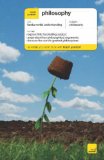 Buy book at: amazon.com amazon.co.uk |
Philosophy (teach yourself series) by Mel Thompson This is a clearly written, accessible introductory text into philosophy. The chapters are concise and the author included notes and examples in boxes which augment the main idea of the chapter. These examples are also useful for discussion in the classroom. The book explains relevant terminology and associated philosophers. Chapters relevant for TOK include (not exclusively):
Additionally, the book contains a chapters on political philosophy (Human Rights issues and Feminism) and the philosophy of religion (science vs. religion debate). While these areas of knowledge do not appear in the TOK sylabus, they may (in my view at least) provide a basis for classroom discussions. |
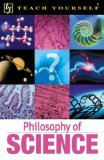 Buy book at: amazon.com amazon.co.uk |
Philosophy of Science by Mel Thompson Comment will be added… |
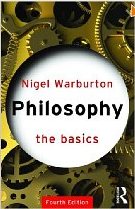 Buy book at: amazon.com amazon.co.uk |
Philosophy: the Basics by Nigel Warburton One of the most salient characteristics of this book is its organization into an argument – counter argument style. The author first presents a topic (e.g. Utilitarianism) and then mentions associated criticisms (e.g. Criticisms of Utilitarianism). He does this with every topic covered in the book. The chapters are short and this way it is possible to get a quick overview of the arguments for and against a certain philosophical view point. The book is a good resource for opposing viewpoint debating. A detailed chapter overview can be seen on the corresponding page of Amazon (link on the left). Chapters relevant for TOK include (not exclusively):
|
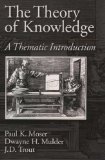 Buy book at: amazon.com amazon.co.uk |
The Theory of knowledge: A Thematic Introduction by Paul K. Moser As the title says, the book is a thematic introduction into epistemology, giving the reader a broad overview of the topic. The book covers areas like belief, truth, justification, rationality, skepticism. Unlike other books it does not specifically address the different ways of knowing (science, history, math, ethics etc.), but places a stronger emphasis on more general TOK principles. |
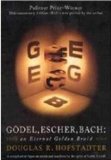 Buy book at: amazon.com amazon.co.uk |
Gödel, Escher, Bach: An Eternal Golden Braid by Douglas R. Hofstadter This is the thickest book of all. In over 700 pages, it covers the area of knowledge mathematics quite exhaustively. You do not have to be a mathematician to understand it. What I (a non-mathematician) like about the book is, its “different” approach to the topic. There are hardly any formulas in the book and certain concepts are portrayed in the form of puzzles. The book has a playful, even entertaining approach to the topic with many dialogues (between Achilles and the Tortoise) in which relevant concepts are explained. Some of these dialogues are also suitable for the classroom. The MU puzzle (see Episode #10 ) is from this book. |
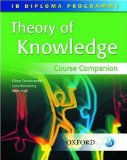 Buy book at: amazon.com amazon.co.uk |
Theory of Knowledge Course Companion by Eileen Dombrowski et al. This is an IB approved TOK book for students. Unlike some other books presented on this page, this book does not place an emphasis philosophical/epistemological theory or names of philosophers. The book is designed to “speak to the student” and get the reader involved and thinking. |
 Buy book at: amazon.com amazon.co.uk |
Ways of Knowing by Michael Woolman This book is specifically written for the IB TOK program. The book addresses fundamental TOK concepts, including relevant TOK theory (which can become useful for the essay and presentation). It is written at a level which can be understood by students. The book also contains a chapter on assessment where the author gives advice on the presentation and the essay and explains the assessment criteria. The chapters are not too long, making them suitable also for classroom reading. Each chapter contains discussion questions, both at the beginning and at the end of the chapter. The questions at the beginning of the chapter encourage the students to think about the topic before reading the actual text. |
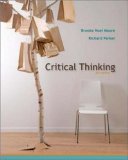 Buy book at: amazon.com amazon.co.uk |
Critical Thinking by Brooke Noel Moore The book (of which I only know the 2nd edition) places a strong focus on reasoning and the evaluation of claims. It is a very comprehensive book in that sense and covers a range of logical fallacies and errors in reasoning. Unlike the other books, it is much less “philosophical” (sorry, don’t know hot to formulate it otherwise) in nature, but resembles more a traditional textbook. There are exercises at the end of the chapters which may prove to be useful for classroom activities. For me as a TOK teacher, I consider the book a helpful addition for covering the topic logics and language, but one has to be selective, otherwise one can easily get carried away with details. |
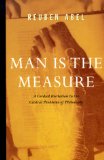 Buy book at: amazon.com amazon.co.uk |
Man is the Measure: A Cordial Invitation to the Central Problems of Philosophy (by Reuben Abel) This is a very readable and accessible introduction into “the central problems of philosophy.”, especially for teachers who prepare for the course and who would like to obtain a broad overview over the topic. Many chapters have direct relevance to Theory of Knowledge, and the examples and quotes not only make reading the book interesting, but also offer plenty of material for classroom discussions. The “theoretical” approach to the topics also makes the book a good reference for various TOK-related theories. If you can not decide which single book to buy for self-education then I’d probably recommend this one. Some schools use this book also as their standard TOK book, but it may be somewhat of an overkill. Having a few copies around for students to use as a reference for the essay certainly doesn’t hurt. Chapters relevant for TOK include (not exclusively):
|
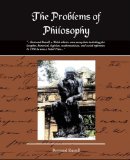 Buy book at: amazon.com amazon.co.uk |
The Problems of Philosophy (by Bertrand Russell) This book is also on the reading list for IB Philosophy. This book covers mostly theory of knowledge and is therefore largely relevant. Written by Bertrand Russell, I consider it one of the standard works of philosophy. It is not easy reading, however. There are also online versions of the book available for free. |
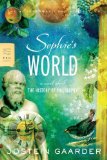
|
Sophie’s World (by Jostein Gaarder) This book is written in the style of a novel with the aim of giving a highly accessible introduction into the history of western philosophy. The text is written for adolescents interested in the topic, but anybody with an interest in the area and no previous education in the field will benefit from the text. People who are not interested in the story line (which is there only to provide a basis for the non-fiction parts) can skip the fictitious parts and only read the non-fiction. This is possible because these parts are alternating and well separated from each other. In the edition that I have read, these two parts even use a different font, so it is easy to locate them in the book. I generally recommend the book to those students who show a stronger interest in TOK or philosophy but who would be scared off by the complexity of philosophy textbooks. I recommend the book as a “beginner’s guide” which starts from pre-Socratic philosophy to present-day concepts. It gives a broad overview of the main philosophical ideas without going too much into depth. In short: read the book if you are interested in philosophy, not if you want to read a novel. |
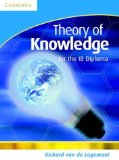 Buy book at: amazon.com amazon.co.uk |
Theory of Knowledge for the IB Diploma (by Richard van de Lagemaat) IB Book. Comment will be added! |
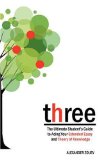 Buy book at: amazon.com amazon.co.uk |
three: The Ultimate Student’s Guide to Acing the Extended Essay and Theory of Knowledge (by Alexander Zouev) Comment will be added! |
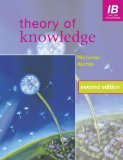 Buy book at: amazon.com amazon.co.uk |
Theory of Knowledge: Student’s Book (by Nicholas Alchin) Comment will be added! |
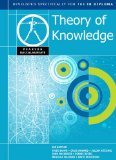 Buy book at: amazon.com amazon.co.uk |
Theory of Knowledge (by Sue Bastian) Comment will be added! |



